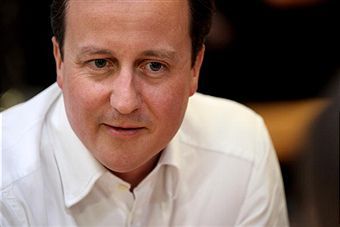 One thing to watch tonight is David Cameron’s strategy for dealing with Nick
Clegg’s plan to take peoples’ first ten thousand pounds of income out of tax. This policy is clear and appealing and one that many Conservatives like. Indeed, Cameron himself called it
a ‘beautiful policy’ in the first debate. So it is imperative, that the Tories have a way to try and defuse it.
One thing to watch tonight is David Cameron’s strategy for dealing with Nick
Clegg’s plan to take peoples’ first ten thousand pounds of income out of tax. This policy is clear and appealing and one that many Conservatives like. Indeed, Cameron himself called it
a ‘beautiful policy’ in the first debate. So it is imperative, that the Tories have a way to try and defuse it.
During the campaign, the Tories have used two different attacks on it. One is to criticise it from the left, to argue that the policy is not progressive as it does not help the lowest paid: you have to earn more than ten thousands pounds a year to get the full benefit of it. The other is what Cameron did in the first debate, attacking it as unrealistic given the size of the deficit.
In political terms, I’m not convinced by either of these approaches. The problem with the first one is that it sets Clegg up to say that the policy makes everyone who earns less than £104,000 better off. While the flaw with the second one is that it allows Clegg to say that the tax cut is fully funded: paid for by clamping down on tax avoidance, the mansion tax on properties worth more than two million, equalising capital gains rates with income tax and only allowing tax relief on pension contributions at the basic rate. These tax rises are either unrealistic or economically destructive. But in the current anti-banker political climate, they won’t put too many people off.
One approach Cameron could adopt is to talk about priorities. He can stress that his first aim is to stop the National Insurance increase—which the Lib Dems won’t—and that as a low tax Conservative, he’ll aim to reduce the tax burden over the course of the next four years. But stopping the increase in the job tax, which could cost tens of thousands of job, has to be any responsible government’s top priority.
PS: Just to show you how appealing the Clegg tax shift can sound, here’s how he described it in his Times interview:
“If you are going to ask the country to undertake the biggest exercise in fiscal contraction arguably since we paid off our wartime debt, then you’ve got to bring people along with you. It’s just not on to constantly tell people it’s pain, pain, pain without some fairness and gain on the other side.” Giving people more control over their money is also a “great ideological distinction” with Labour. “Labour’s answer is constant tweaking of the benefits and tax credits system, an assumption of dependency. Ours is an assumption of independence. If we do get the most votes, we can really push hard to deliver that fair tax switch.”







Comments